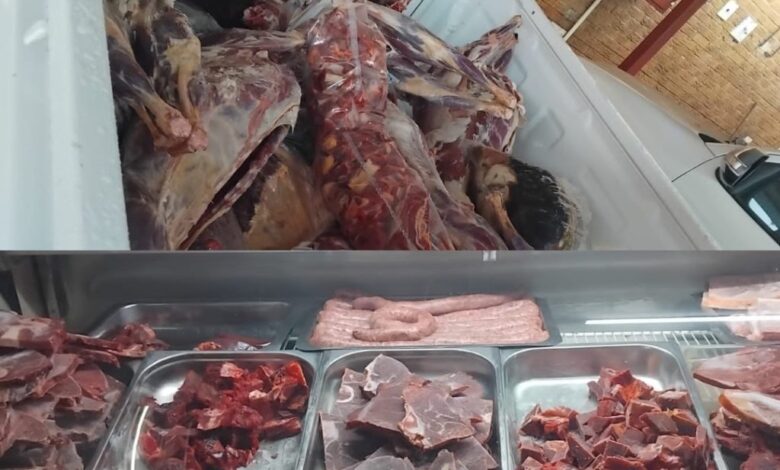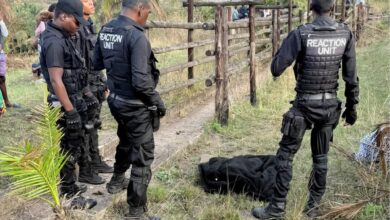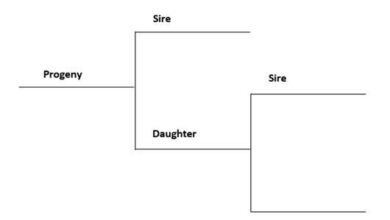Meat Safety Raids Expose Stolen Stock In Limpopo

Like their commercial counterparts, subsistence farmers in most parts of Limpopo are grappling with livestock theft. The scourge has forced many rural animal owners to organise themselves into community forums to protect their cattle, goats and sheep. Some even conduct physical searches in areas where they suspect that stolen animals are hidden.
By Montsho Matlala
At the same time, police have stepped up their efforts against the illegal meat trade. Officers often confiscate carcasses and fine traders who violate the Meat Safety Act by failing to produce proof of origin for the animals they slaughter.
Earlier this month, the Marble Hall Stock Theft and Endangered Species (STES) Unit carried out surprise inspections at butcheries in the small farming town of Marble Hall, which falls under the Ephraim Mogale Local Municipality in the Sekhukhune District.
Eight goat carcasses and two cow heads were seized during the operation. One butchery owner was slapped with an R1 000 admission-of-guilt fine for contravening the Meat Safety Act, and another trader received a R100 fine for failing to issue proof of purchase to a livestock buyer in terms of Section 6(1) of the Stock Theft Act.
“These disruptive operations are carried out jointly with the departments of agriculture, economic development, environment and tourism, and Schuinsdraai Nature Reserve meat safety officers,” said Colonel Malesela Ledwaba, Limpopo police spokesperson.


Farmers Want Deeper Investigations
Although rural livestock owners have praised the police for clamping down on illegal traders, they say tougher investigations are needed.
Kgalape Puoane, secretary of the Barui ba Sekhukhune Anti-Livestock Theft and Prevention Forum, said: “The unbranded animals don’t necessarily mean they are ownerless. It could be that the farmer failed to comply with branding regulations. Police should engage farmers and circulate skins of slaughtered animals for identification. Farmers’ groups are well organised and can help close the gap.”
According to Barui Forum member Phillip Magane, livestock theft syndicates operate across provincial borders.
“We travel to faraway places following up on leads for stolen stock. Sometimes we find our animals in the Free State, while Limpopo police recover cattle belonging to farmers in Gauteng or North West. Syndicates exchange stolen animals across provinces to cover their tracks,” he explained.
Shibe Moloto (84) of Senwabarwana in Capricorn District lost all her 40 cattle in a single day in January. “Since then, I’ve been sick and frail. I have no appetite and don’t know if I will survive to see the next January,” she said.
Jimmy Maswanganyi (59) of Muhlava village in Mopani District didn’t see his nine cows again after letting them out to graze on 8 August. “As usual, I expected them back at sunset, but they never returned. I searched the veld and later reported to police. I can only hope they’ll be found,” he said.
Zebulon Masalesa (68) of Bakenberg in Waterberg woke up on 18 August to find his kraal broken and all 15 goats gone. “We only saw car wheel tracks in the yard. The goats were clearly taken by vehicle,” he said.
The risk that stolen animals end up in butcheries and with street vendors worries farmers and consumers alike.
Maggie Masombuka (50) of Kwa-Dlawulale, Groblersdal, said she stopped buying her favourite tripe after witnessing suspicious deliveries at a local butchery.
“I saw a bakkie arrive with a cow’s legs sticking out from under plastic. Since then, I no longer buy meat there. But where can we run [to]? Even informal street traders look for cheap stock, which may come from stolen animals.”

Speaking at a crime prevention rally in Senwabarwana on 20 August, Limpopo Police Commissioner Lieutenant-General Thembi Hadebe reiterated her appeal to farmers.
“Brand and shelter your animals, and make sure herders have legal identification documents. Work with police to protect your neighbourhoods. Avoid mob justice and protect community resources,” she said.
Despite ongoing crackdowns, livestock theft continues to erode livelihoods in Limpopo, costing communal and commercial farmers alike. For many, the pain is not just financial but also emotional, as they see generations of hard work vanish overnight.
Until tighter enforcement is paired with farmer-police collaboration and stricter control of meat markets, stolen animals are likely to keep finding their way onto unsuspecting consumers’ dinner tables.



